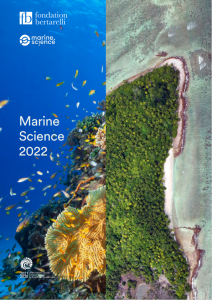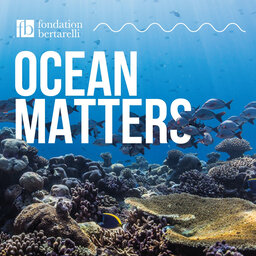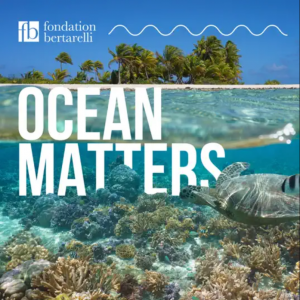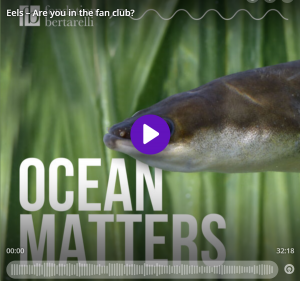Professor Andrew Brierley
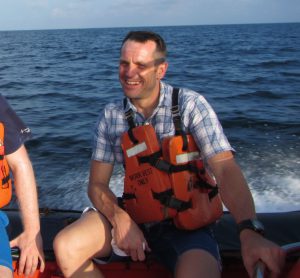
Professor Andrew Brierley passed away on the evening of the 20th of February, following a battle with an aggressive brain cancer diagnosed in November last year.
Andy will be remembered by his colleagues and friends as a passionate advocate for scientific inquiry and formidable champion of his students. Andy started his career in marine biology researching the population genetics of squid, before moving to the British Antarctic Survey where he began his lifelong fascination with krill, which he investigated through echosounders. Andy’s first trip to Chagos was in January 2015 and resulted in the first regional baselines for pelagic prey and fish populations. He is survived by his partner Kirsti and his daughters Abi and Laura.
From Tom Letessier, former student of Andy.
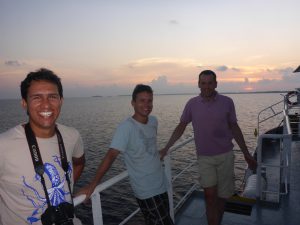
From Pete Carr, reflecting on his friendship with Andy.
I first met Andy in 2015 on a science expedition in the Chagos aboard the patrol vessel, the Pacific Marlin. He was everything I admired in a person. A straight-talking no-nonsense academic who did not tolerate and called out slackers and fakers. The converse side of his sometimes-brash character was that he was fiercely loyal and supportive of those who gave their best. Andy thought big in terms of scientific research and conservation solutions. He was also physically a big man with an impressive CV of mountain marathons, iron-man and endurance events to his name. I thought he was both brilliant and physically indestructible.
I last saw Andy in November 2023. We drank beer and told tales. One was of how he broke his leg on a mountain run in Scotland and crawled for hours in running vest and shorts until he found a phone signal to initiate his rescue. Leg mended, we were talking of future adventures in the hills together. I still thought he was brilliant and indestructible. We were unaware that his tragic fatal medical condition would erupt the following week.
Professor Andrew Brierley was a true friend of mine; an inspiration, accomplished academic, physical powerhouse and ace raconteur and I will always regret never having had that last adventure with him.
The Marine Science community sends their thoughts and condolences to all of Andy’s family, friends and colleagues on learning this sad news.

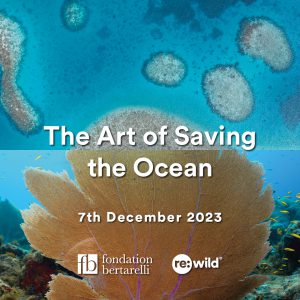
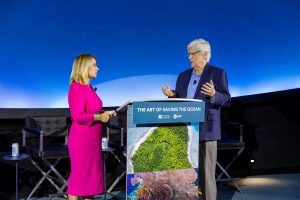
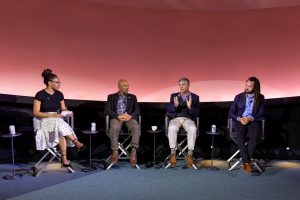 The second session, Rewilding in Action, consisted of two panels. The first panel covered a series of case studies from island and coastal communities currently undertaking rewilding efforts. The second panel then discussed how we can take these examples and scale them up beyond individual islands or archipelagos.
The second session, Rewilding in Action, consisted of two panels. The first panel covered a series of case studies from island and coastal communities currently undertaking rewilding efforts. The second panel then discussed how we can take these examples and scale them up beyond individual islands or archipelagos.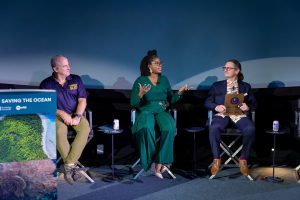 People and Nature, the third session of the day, began with Francine Madden from the Center for Conservation Peacebuilding who told us about her work mitigating conflict between human and wildlife, and differing communities for the sake of advancing conservation. Then, local community members from Antigua, special forces veterans, and early career scientists, each involved in restoration and rewilding, demonstrated the importance and opportunities for diverse sectors to engage in conservation activities.
People and Nature, the third session of the day, began with Francine Madden from the Center for Conservation Peacebuilding who told us about her work mitigating conflict between human and wildlife, and differing communities for the sake of advancing conservation. Then, local community members from Antigua, special forces veterans, and early career scientists, each involved in restoration and rewilding, demonstrated the importance and opportunities for diverse sectors to engage in conservation activities.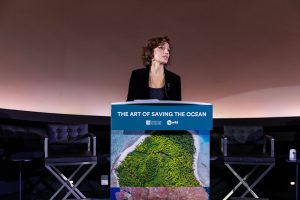 To close out the day, UNESCO Director General Audrey Azoulay spoke on behalf of the UN Decade of Ocean Science for Sustainable Development. Ms. Azoulay reminded us of the importance of protected areas, and the invaluable interactions between science and local knowledge for the sake of protecting our oceans.
To close out the day, UNESCO Director General Audrey Azoulay spoke on behalf of the UN Decade of Ocean Science for Sustainable Development. Ms. Azoulay reminded us of the importance of protected areas, and the invaluable interactions between science and local knowledge for the sake of protecting our oceans.